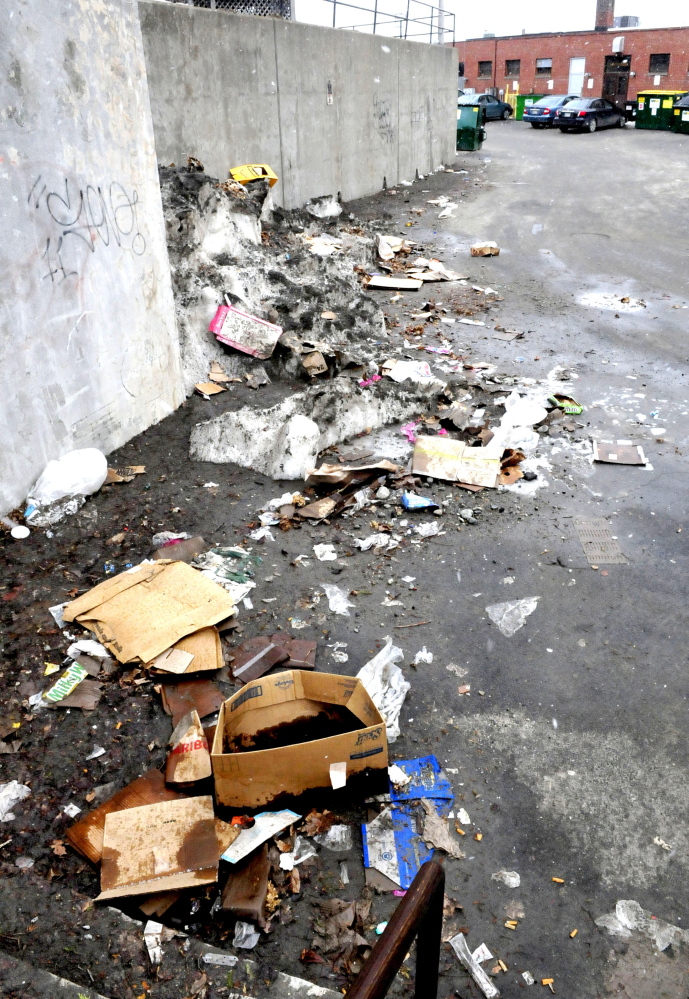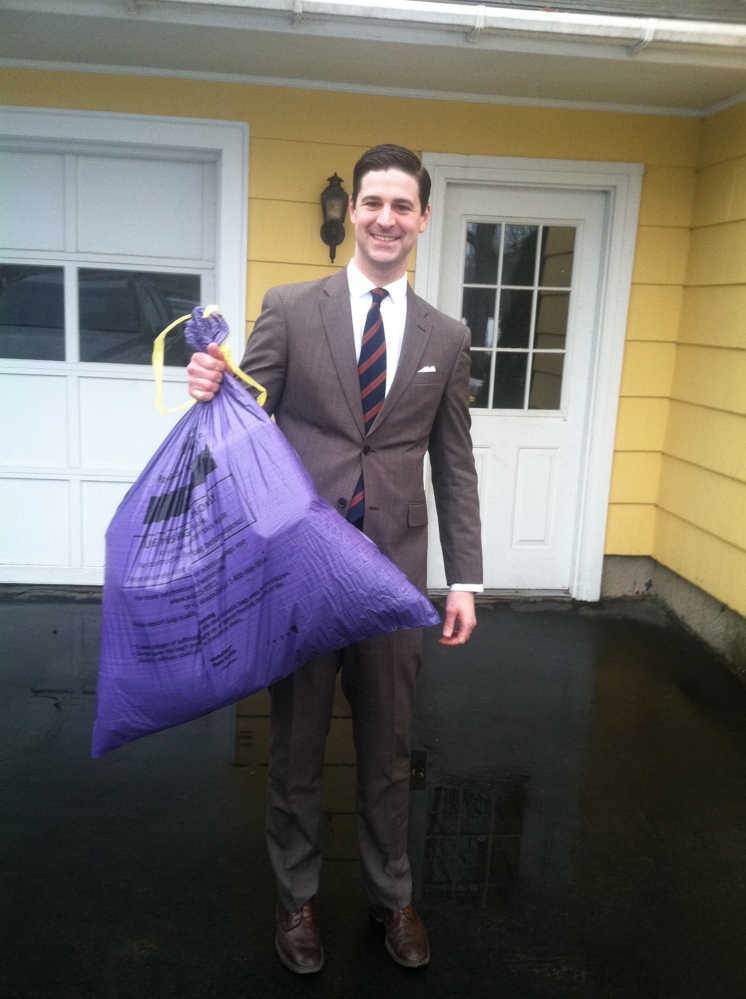WATERVILLE — The city has some major and expensive decisions to make about trash collection.
Its contract with Penobscot Energy Recovery Co. in Orrington, which burns the city’s rubbish, is nearing expiration, and a vote is set in nearly three months on whether to keep the new pay-as-you-throw program.
“More than any other municipal service, trash disposal, by far, will be the biggest and most difficult item for us in the next three to five years,” City Manager Michael Roy said Monday.
Now, Waterville is one of 187 communities that own 25 percent of the Orrington company known as PERC. Waterville’s contract with the incinerator business as both a customer and partner ends in 2018. Waterville and others will have a decision to make and could band together with other communities and build a solid waste disposal plant instead.
Waterville pays $60 a ton to dispose of trash at PERC, and the price under a new contract could increase to an estimated $110 to $120.
Roy said other possibilities for the future include continuing to dispose of trash at PERC or finding another option. Those 187 communities are represented by the Municipal Review Committee, which is spending money to study options, he said.
“I think the central question is, does the city want to become a partner in a solid waste option, whatever it is, three years from now, or do we just want to be a customer at a landfill or other trash disposal place?” Roy said.
At the end of 2015, the review committee will offer recommendations on what options would be available and city officials will discuss those possibilities in greater detail, he said.
Meanwhile, the city is projected to cut in half its trash tonnage sent to PERC and to reduce thousands of dollars in city expenses after enacting a new pay-as-you-throw trash collection program.
Waterville city councilors decided last year to launch the controversial pay-as-you-throw system of trash disposal with the stipulation that voters would have a chance to repeal it if they wish in a June 9 referendum. As part of pay-as-you-throw, residents buy special purple bags for their trash and put them at the curb to be picked up weekly by the city’s Public Works Department and taken to the Oakland transfer station. From there, the trash is taken to PERC.
The program also involves curbside pickup of single sort recycling — meaning all materials go in a single bin — at no additional cost to the resident. The city pays Sullivan Disposal of Thorndike $72,000 to pick up the recyclables and take them to Ecomaine in Portland, where the collected material is sorted.
Residents are not required to use pay-as-you-throw, which started in September, and may instead hire private haulers to pick up their trash.
The amount of trash Waterville annually sends to PERC is projected to drop from about 4,400 tons a year to 2,000 tons by the end of June, which is the end of the city’s 2015-16 fiscal year.
In addition, Roy and the city’s finance director, Chuck Calkins, said last week at a council budget workshop that the city expects to generate $430,000 a year with pay-as-you-throw through trash bag sales and reduced trash tipping fees. They said the city received $136,000 in revenue from the bag sales from September 2014 through February this year — a little less than projected.
If voters decide to repeal pay-as-you-throw in the ballot vote, the city would have to find the $430,000 savings elsewhere in the budget and it would have to add $72,000 to that figure if the city were to decide to continue with the recycling program, according to Roy and Calkins.
Some residents opposed launching the program, saying they should not be forced to buy special trash bags. The council voted 5-2 to approve a $37.2 million municipal and school budget that included pay-as-you-throw. Council Chairman Fred Stubbert, D-Ward 1, and Karen Rancourt-Thomas, D-Ward 7, voted against the budget because of the trash program.
At a budget workshop earlier this year, Stubbert said that he has been concerned that resistance to the requirements that residents buy city trash bags in order to have garbage collected by the city could lead to people trying to dispose of trash illegally. He said some landlords have already complained about accumulations of illegally disposed trash near apartment buildings.
The 30- and 15-gallon purple trash bags are supplied to area businesses by WasteZero of Portland. The 30-gallon bags sell for $10 for a roll of five bags, while the 15-gallon bags are $10 for a roll of eight. The businesses that carry the bags get no profit from their sale; the city and WasteZero both receive profits.
PROGRAM TO BE EXAMINED
Residents will have an opportunity to ask questions about and comment on the pay-as-you-throw trash system on Wednesday, April 15. The public meeting will be held 7-8:30 p.m. in The Forum room at The Center at 93 Main St.
Mayor Nick Isgro asked that the meeting be held so residents could see the numbers — how the city benefits from the program and what would occur if it is repealed.
A lot of people do not get involved in the city’s budget process, and this is a way for them to see that pay-as-you-throw can have a big impact on the budget, he said. It also is a chance for people to discuss it in an informal setting, away from the council chambers, he said.
“I’m a numbers guy, and I really want people to be engaged in the budget process and understand the budget process,” Isgro said. “We should at least let people know — here are the numbers.”
As much as trash is an issue, people also should see that the entire budget impacts their taxes, he said.
“Frankly, the more input we have, the better — the more people looking at it, the better. It’s their budget. We work for the taxpayers, and it’d be nice if they feel they have a stake in it, because they do.”
Isgro said the April 15 meeting will be “conversational.”
“There’s no pressure here because there is no vote happening,” he said. “This is more of a conversational discussion, so hopefully people will feel comfortable.”
He said the meeting can include talk about whether the current trash collection system can continue without residents having to pay for trash bags.
“Now’s the time to do that before we finalize the budget,” he said.
Isgro noted that council meetings and budget workshops are open to the public. Council meetings are held the first and third Tuesday of the month, typically at 7 p.m. Budget workshops will be held at 6 p.m. today, as well as Tuesday, April 14, and Tuesday, April 28. The budget requires three council votes, and the first is expected at the May 5 council meeting with the second and third votes expected May 19.
Like Isgro, Roy encourages people to attend the April 15 meeting.
“We certainly would like as many people as possible come to hear how it’s gone since we started with recycling and pay-as-you-throw,” he said. “Our purpose is, this is a fact-finding thing, just to get information to people so they can make up their own minds.”
RECYCLING QUESTIONS
Lissa Bittermann, business development manager at Ecomaine, plans to be at the April 15 meeting to answer any questions people have about recycling.
Bittermann said Monday that the Ecomaine plant processes 18 tons of recyclable materials per hour.
“The materials get separated from each other based on the majority makeup or ingredient of the various materials,” she said.
For instance, if a notebook comes in that has a metal binder, it is considered in the paper category because it’s mostly paper.
The notebook is bundled up with other paper items and sent to whatever mill or factory buys the material and that plant has all types of mechanisms to remove metal binders, staples, paper clips, ring binders, clear plastic from envelopes and other items from the paper, according to Bittermann. The same would apply to a scrapbook that has a metal binder or a milk jug that has a different type of plastic than its cover, she said.
The process is different for glass jars with metal covers, because glass is the only recyclable material coming into Ecomaine that does not have a market in Maine, Bittermann said. Ecomaine crushes the glass, removes the metal covers to be recycled and takes the glass to its own landfill to be used for filling pot holes and shoring up berms — and it is mixed with gravel to make roads at Ecomaine’s landfill and waste-to-energy power plant.
When loads of recyclables come to Ecomaine, they are sorted by machines and some items are sorted by hand.
Bittermann said the items that probably cause the biggest problem in the sorting process are plastic film, plastic bags, wood stove pellets, cat and dog food bags, grain bags, birdseed bags, plastic wrap and plastic tarps. Dog and cat food bags may appear to be made only of paper, but many have plastic linings, she said.
The various plastics wrap around separators and fill empty spaces, and at least once a day, the system must be shut down and workers must go in and cut away the plastic causing the problem, Bittermann said.
The only plastic film that people should recycle is single-use grocery bags, she said.
Other items people should not recycle are propane and helium tanks which can explode in the plant; sharps or needles that people tend to place in detergent bottles, forget they are there and put them in their recycling bins; and clothing, shoes and food.
Amy Calder — 861-9247
Twitter: @AmyCalder17
Send questions/comments to the editors.





Success. Please wait for the page to reload. If the page does not reload within 5 seconds, please refresh the page.
Enter your email and password to access comments.
Hi, to comment on stories you must . This profile is in addition to your subscription and website login.
Already have a commenting profile? .
Invalid username/password.
Please check your email to confirm and complete your registration.
Only subscribers are eligible to post comments. Please subscribe or login first for digital access. Here’s why.
Use the form below to reset your password. When you've submitted your account email, we will send an email with a reset code.